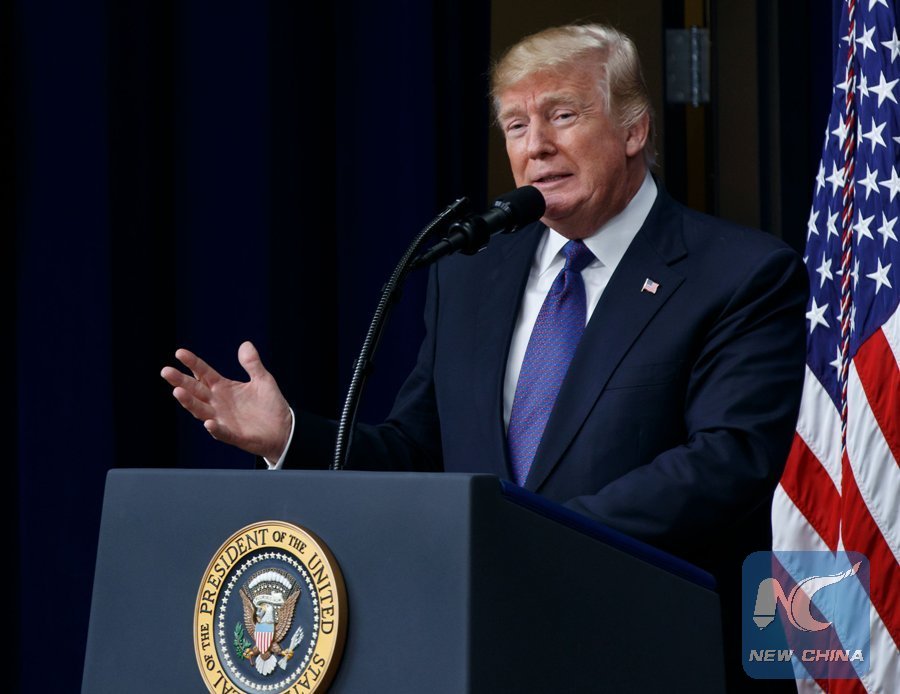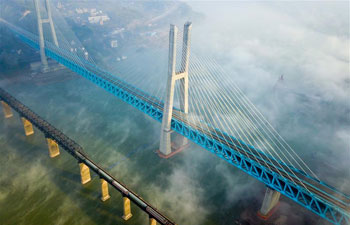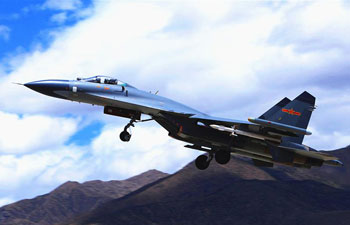
U.S. President Donald Trump speaks at the Conversation With the Women of America panel at the White House in Washington D.C., the United States, on Jan. 16, 2018. (Xinhua/Ting Shen)
by Xinhua writer Zhu Dongyang
WASHINGTON, Jan. 18 (Xinhua) -- While trying hard to put America first around the world during his first year as U.S. president, Donald Trump has turned the country increasingly self-serving and the wider world ever more unsettled.
Trump's record, characterized by his many featuring "disengagement diplomacy" and "twitter diplomacy," has prompted the U.S. retreats from multiple treaties and multilateral institutes, generating outrage in states he named and shamed indiscriminately.
His bluster and bigotry have unnerved countries in the Middle East, Latin America, across the Atlantic, and on the Korean Peninsula, where the real risk of a calamitous nuclear confrontation has grown exponentially.
Under the "America First" banner, Washington has become less bonded than before by global norms and responsibility, yet more inclined to threaten others with sanctions, aid suspension and nuclear intimidation. The country now makes no secret of its preference for its own interests to the general good, and fists over reason.
For the world, the Trump administration's backtracking on multilateralism has stirred spillovers, emboldening others to justify the denial of international consensus and the subsequent change of hard-won status quo.
On the heels of Trump's widely-condemned announcement in December to recognize Jerusalem as the Israeli capital, Israel's parliament passed legislation blocking its government to cede East Jerusalem in any future peace deal with the Palestinians. Now more bills are on the way to separate Palestinian neighborhoods from Jerusalem, and bolster the expansion of the Israeli settlements in the West Bank. The peace prospect of this war-torn land now seems more elusive than ever.
In Trump's eyes, he has been leading the United States out of the "comfort zone" by resetting pivots and modifying international "fundamental assumptions." But his moves have merely led to a trust crisis among U.S. allies and beyond.
"The times in which we could completely depend on others are, to a certain extent, over," said German Chancellor Angela Merkel after attending the G7 summit in May. "I've experienced that in the last few days. We Europeans truly have to take our fate into our own hands."
In response to the U.S. suspension in January of the security aid to Pakistan over "disappointment" of its anti-terror performance, Pakistani Foreign Minister Khawaja Asif said he saw the Islamabad-Washington alliance was over.
U.S. Secretary of Tillerson noted earlier this month that 2018 will be "a year of execution" of foreign policies designed and developed last year. If so, the world may need to prepare itself for a United States more eager to project its hard power wherever and whenever it deems necessary.
For the rest of his presidency, Trump may need to know that in this age of globalization, where the fates of all nations are unprecedentedly connected, no one can make a single country great without joining others for broader prosperity.
The pathway leading towards putting America First relies on whether members of this interdependent international community could come together for their common good, instead of going separate ways for pure self-interests.















